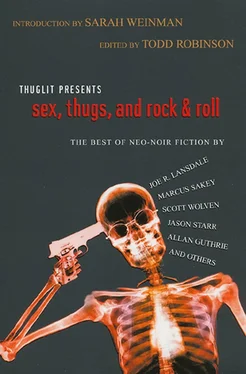The older of the two men was a friend.
Joe Coyne had been one of Gurevich’s training officers when he started with the sheriff’s. Joe was beefier now, but still looked like the UCLA wrestler he had once been. The other detective was Bert Engelman, a twenty-something ex-marine, Coyne’s latest detective trainee.
He shook hands with both men as Joe introduced Gurevich to his partner. “I knew Bill when he used to work for a living,” Coyne said.
Gurevich avoided looking at Lencheski’s body and said, “What can I tell you? I got too old to chase ’em. Now all I do is check their ear tags.”
“Somebody tagged this homeboy real good,” Engelman said. “Beat the crap out of him, then crammed cake and frosting down his gullet until he suffocated.”
“Sweets to the sweet, huh?” Gurevich said.
The medical examiner yanked a probe out of the dead man’s liver and made a note.
Lencheski’s face was smeared with cake and frosting, his eyes open, his dislocated jaw agape. What remained of the cake was still in its box at Lencheski’s side, smashed, the picture on its top obliterated.
“Anybody you like for this?” Joe Coyne said.
Gurevich said, “You know about the Halpert woman, right?”
“She was the first one I thought of too,” Coyne said, “but we can place her with her husband last night. He’s LAPD, a lieutenant at Newton Division. They were in Palm Springs when this went down, attending the D.A.R.E. To Keep Kids Off Drugs Golf Tournament.”
“Hell of an alibi,” Gurevich said.
“Partner, give us a minute, okay?” Coyne said.
Engelman stepped out of the room. Coyne took Gurevich’s arm and led him a few steps away, out of the ME’s hearing.
“I hear what you’re saying,” Coyne said. “Maybe it’s too good. Maybe the husband leveraged a snitch or another ex-con into whacking Lencheski for him. Or hell, maybe it was one of the wife’s supporters.”
Gurevich said, “Yeah, any of that’s plausible.”
“Between you and me, though, this diaper-sniper son of a bitch got what he deserved,” Coyne said. “He molested a cop’s kid. So screw him, I’m writing this one up as a bottom-of-the-pile residential burglary gone wrong.”
“I’ve got no problem with that,” Gurevich said.
“Glad you feel that way, Bill,” Coyne said. “LAPD or sheriff’s or corrections, none of that interagency turf war crap matters now. This one’s still in the family. And we take care of our own, right?”
Gurevich watched the ME’s men wrap Lencheski’s body in a sheet and lift it onto their gurney.
“If we don’t, who will?” he said.
Duke pulled into Colfax after a brutal deadhead-two days through Colorado and Nevada, a blur of truck stops, crank, and short blackouts in the cab.
Nobody gave him a second look. He dropped the rig at the lot, grabbed some food, then crashed for ten hours at a Super 8 on the highway. The radio alarm blasted him awake: Art Bell talking UFOs and gray aliens on Coast-To-Coast A.M. It was four in the morning-the Day Of Revenge. He got some coffee, then walked over to pick up his load.
Moths swarmed an arc light over the lot gate. The warehouse used to be a transload facility for animal feed, but now it was the staging ground for the end of the world. Duke shivered and rang the bell. A bolt lock clicked. The old man opened the door, his shadow fanning across the dock in a frame of yellow light.
“Ever’thing’s ready.” Gramps passed over keys and papers, his hand knotted with tendons, a Black Sun tattoo on his wrist-the symbol of infinite light and the secret philosophy. “They finished loadin’ an hour ago. Cleaned up good. I put the switch under the radio.” He squinted, his eyes cloudy. “Red knob on a black box. Turn it all the way to the right…that’s all she wrote.” He lit a Pall Mall, the match flaring in his cataracts. “Ten thousand pounds of ammonium nitrate and fuel oil primed with TNT. It’s stable enough, but you flip that switch in the middle of the span and they’ll never know what hit them.”
Duke didn’t say anything. He stared at the blacktop, watching a beetle crawl over a broken bottle.
“We won’t forget.” The old man shook his hand. “Ain’t nobody gone forget what you done.”
Duke’s rig was a Mack, six axles, with twin exhausts and a forty-foot trailer. He pulled himself into the cab, strapped in, and turned it over. The diesel caught and rumbled, pipes muttering, and he could feel the vibrations down the levels of his spine. He backed out with a clash of gears, braked in a wheeze of hydraulics. The old man stood in the headlights, giving him the Roman salute.
Duke worked the transmission, put it in low, then clattered out of the lot, banging over potholes on the way to I-80. A quarter moon drifted through clouds over the Sierra, watching him like an ancient eye.
Next stop: rush hour on the Bay Bridge.
The feds had him under surveillance the whole time. Duke spotted one of their tail cars, but it fell back on the highway and he never saw it again.
Hunched over the wheel, he rolled through New England Mills, Weimar, and Heater Glenn, heading towards Sacramento and the Central Valley. Taillights floated through the dark and the wind fluttered in the vents. He turned on the radio as the sun cracked the mountains, glinting on Lake Combie west of the Placer Hills.
The radio spewed trash and propaganda. Punching buttons, he skipped over the news: a Viagra commercial, some hip-hop, and a spot for the latest diet pill. A shock jock asked a stripper her cup size, then cut to a break.
The pawn in the White House ranted about militias and right-wing extremists.
Duke turned it off. He ran nasty flashbacks.
Two months ago, his son died in Iraq, his wife divorced him, and he volunteered to blow himself up to kick-start the Revolution. When he came to his senses, it was too late to change his mind. You’re our driver, his cell leader told him. Die for the Race or we’ll blow your head off.
A meth bust had saved his life.
The BATF knocked down his door a couple weeks later and popped him with five pounds of crystal, sixty grand in cash, a sawed-off Mossberg, and a copy of the Turner Diaries . He flipped after a six-hour talk with the feds downtown. Thirty years or rat off The Order-that was the deal. ZOG needed a high-profile bust to justify the War on Terror.
Duke caved. He turned informer.
Call it a sweet relief.
The feds were waiting for him at a rest stop a couple miles from Clipper Gap. Duke pulled in and parked the rig by the johns; then he climbed down from the cab and walked over to a white van and a panel truck parked by the exit. Dawn bled over the dark hills. Bugs clouded the lights by the picnic shelter and the air smelled like crap and damp grass.
“Give me the keys.” Special Agent Johnson of the Internal Security Division stood by the van in his trench coat, smoking a cigarette. The van door opened and a couple of goons stepped out, carrying tool kits and wearing body armor under vests marked BOMB DISPOSAL. Duke gave Johnson the keys and he passed them to one of the goons. “Take your time, okay? We don’t want any accidents.”
“They rigged the primer to a switch,” Duke said. “Black box with a red knob under the radio.”
“That’s what they told you anyway.”
Voices babbled on a scanner in the van. Five suits wearing headset mikes got out of the panel truck and walked over to the rig, circling the trailer, checking the cab while the bomb guys unpacked their gear on the blacktop.
“You had a tail.” Johnson blew a smoke ring. He looked like an insurance salesman, but he had the eyes of a robot. “The CHP pulled them over a couple miles back.”
Читать дальше












